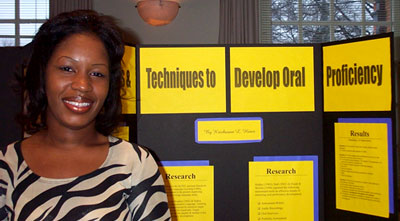Professor links African and Latin cultures
By Sandra IsleyWinston-Salem Chronicle | Last updated: Mar 21, 2006 - 6:49:00 PM
What's your opinion on this article?

Professor Krishauna Hines
|
WINSTON-SALEM, N.C. (NNPA) - Students at Bolton Elementary School received a global lesson on African influence in Latin cultures as part of a Black History Month program.
Recently, Krishauna Hines, a Spanish professor at Salem College, gave an Afro-Latino presentation to Bolton’s Spanish classes. The presentation evolved from the two degrees she has earned in Spanish.
“I wanted to find a connection with my culture and what I was studying,” said Ms. Hines, who is Black. “In the spirit of Black History Month, I looked for a way to globalize the discussion so that it goes beyond the borders of the United States and is inclusive of the African Diaspora.”
A familiar connection to African history in this country and Latin America wasn’t too hard to find, for both have a history of slavery. That is how African ancestry came about in both countries.
“They got there the same way we got here,” Ms. Hines said.
Even though her message is one of commonality, she has a greater reason for educating others about the link between the two ethnic groups.
Ms. Hines explained, “The purpose of this presentation is to let African Americans and others know that they need to become more marketable in a global economy.”
Through a slide presentation, music and other forms of media, she showed, not only the influence of African culture on Latinos, but also the influence that Afro-Latins have on American culture. The students went into a frenzy as she highlighted the lives of Afro-Latin celebrities. Some of the names included Alfonzo Ribeiro (Dominican actor who played Carlton on “Fresh Prince of Bel Air”), Sammy Sosa (Dominican baseball player for the Orioles) and Mariano Rivera (Panamanian pitcher for the New York Yankees). Students were very responsive to the presentation as some played the tambourine, drums and other instruments, while others enjoyed watching the big screen.
In her presentation, Ms. Hines hoped to bridge an educational gap beyond the language barrier. “I felt if they found a connection with the culture, they may see that it’s more important than just learning about the language,” she said. “We cannot separate the language from the culture. They are inextricably linked.”
Oftentimes speaking in Spanish, she explained in great detail the influence that Africans had in Latin America, which is not just in music, food and dance. “African influences can be found in areas of science, exploration and architecture,” she pointed out.
Elated with the students’ reaction, Ms. Hines felt that her message of diversity and commonality was well received. “The students walked away from the presentation with greater understanding of the complex diversity found in Latin America,” she observed. “I think it is imperative that students from the States understand that Black History Month is not confined to the United States. It extends far beyond our borders. We have an entire family out there who shares our history and heritage.”
INSIDE STORIES AND REVIEWS
-
-
About Harriett ... and the Negro Hollywood Road Show
By Rabiah Muhammad, Guest Columnist » Full Story -
Skepticism greets Jay-Z, NFL talk of inspiring change
By Bryan 18X Crawford and Richard B. Muhammad The Final Call Newspaper @TheFinalCall » Full Story -
The painful problem of Black girls and suicide
By Charlene Muhammad -National Correspondent- » Full Story -
Exploitation of Innocence - Report: Perceptions, policies hurting Black girls
By Charlene Muhammad -National Correspondent- » Full Story -
Big Ballin: Big ideas fuel a father’s Big Baller Brand and brash business sense
By Bryan Crawford -Contributing Writer- » Full Story






 Click Here Stay Connected!
Click Here Stay Connected!








